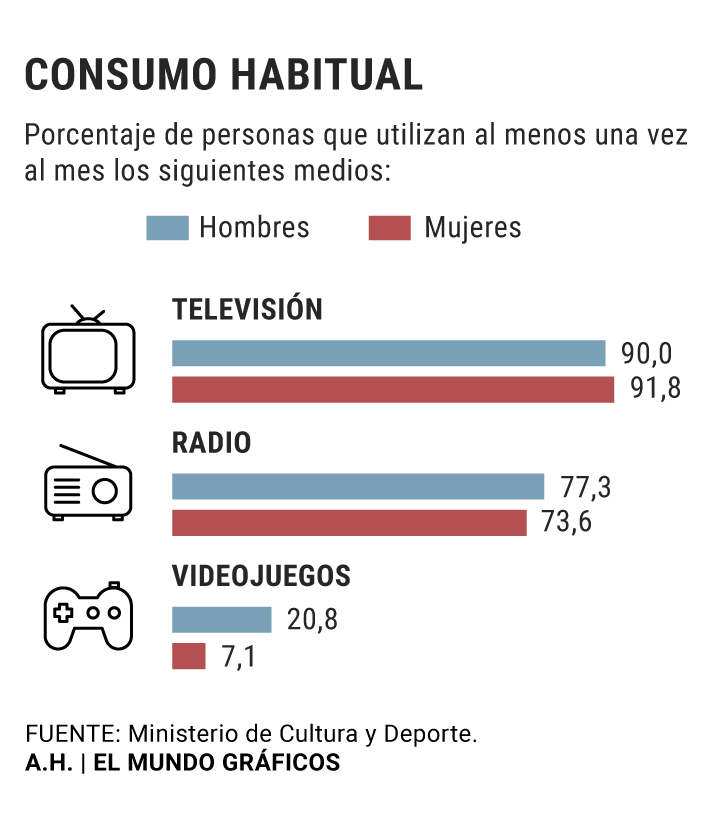Women read more books, go to more concerts and more theater plays and frequent more the cinema and exhibition halls. Men, on the other hand, love all the culture and information that comes to them through pots. They play musical instruments, buy video games, take pictures and are watching the news on their screens. They also like bulls and go to see monuments and archaeological sites.
If there were no statistics to endorse them, phrases like the ones above would sound a bit embarrassing in 2019. But it turns out that this time there are numbers: according to the Survey of cultural habits and practices in Spain that the Ministry of Culture and Sports produces every four years, the Women score highest in almost all culture consumption rates. They read more books: 69.2% of the women had read during the last year and 60.4%, during the last quarter. In men, the percentages fall to 62.0% and 52.1% respectively. Women are also a bit more intense among frequent readers: they read 4.8 books a quarter; them, 4.7.
And there is more: 16.5% of women say they have more than 200 books at home. Among men, the percentage drops to 15.1%. 9.2% of women and 8.1% of men write. They also go more to libraries and attend more reading clubs. Similar conclusions are obtained in any other category analyzed by the study.
Why this demand? In the case of literature, high female demand is an ancient phenomenon that has to do, among other things, with stereotypes of the nineteenth century still in force.For example, the Emma Bovary-style passive muse that finds in the books a way to socialize and build your identity. The idea comes from the good girls do not read novels, an essay by the Italian Francesca Serra (Peninsula), which explained that the publishing industry has perpetuated that mold through a wide range of entertainment literature focused on what is supposed to attract to women.
The bias between men and women is not the only one relevant in the Survey of cultural habits and practices in Spain. Other cuts are obvious (people with higher education consume more culture) or almost obvious (those under 25 and those over 45 are the most active). Another variable, new and interesting, relates the memory of having had an active cultural life in childhood with adult habits.
Thus, 85.6% of Spaniards who have read a book for leisure during the last year were children's readers. The same statistic for those attending shows: 64.4% of those attending concerts or theaters remember having gone with their parents in their childhood.
Those responsible for the Survey of cultural habits and practices in Spain have also opened a research path aimed at discovering what percentage of Spaniards participate in cultural life as a whole. Some data: 85.9% of the people who attended museums or art galleries are readers, 20 points more than in the population as a whole and 6.4% of them also went to the opera (compared to 3 , 3% of the total population). Similar data intersects all cultural habits: going to the movies, listening to music, going to dance shows ...
The Survey of cultural habits and practices in Spain is the most ambitious effort to know the relationship of Spaniards with culture. It is carried out every four years under the National Statistical Plan and this year has required 16,000 interviews with people over 15 years that developed between summer last year and spring 2019.
This year's edition can also be read in relation to those of 2015 and 2011. Eight years ago, the Survey portrayed the collapse of culture consumption in the most pessimistic years of the economic crisis. In 2015, culture consumption rates traced back with intensity. In 2019, the summary is the consolidation of the increase. They increase the indexes of reading, the interest by the performing arts and by the art, the attendance to the cinema, the purchase of video games and the demand of information ... There are only loose cases of loss of demand: the circus and the zarzuela.
Last question: can these data be compared with those of other European countries? No. All countries do similar studies but no one in the European Union has worried about making them homologous.
According to the criteria of The Trust Project
Know more- movie theater
- theater
- culture
- music
- Art
- literature
The Paper Sphere Carlos Granés: "The wrong art is finished. Goodism triumphs"
LITERATURAMarlon James: "I wanted to find 'The Lord of the Rings' in Africa"
'The institute' Terror and reality, the hallmarks of Stephen King

